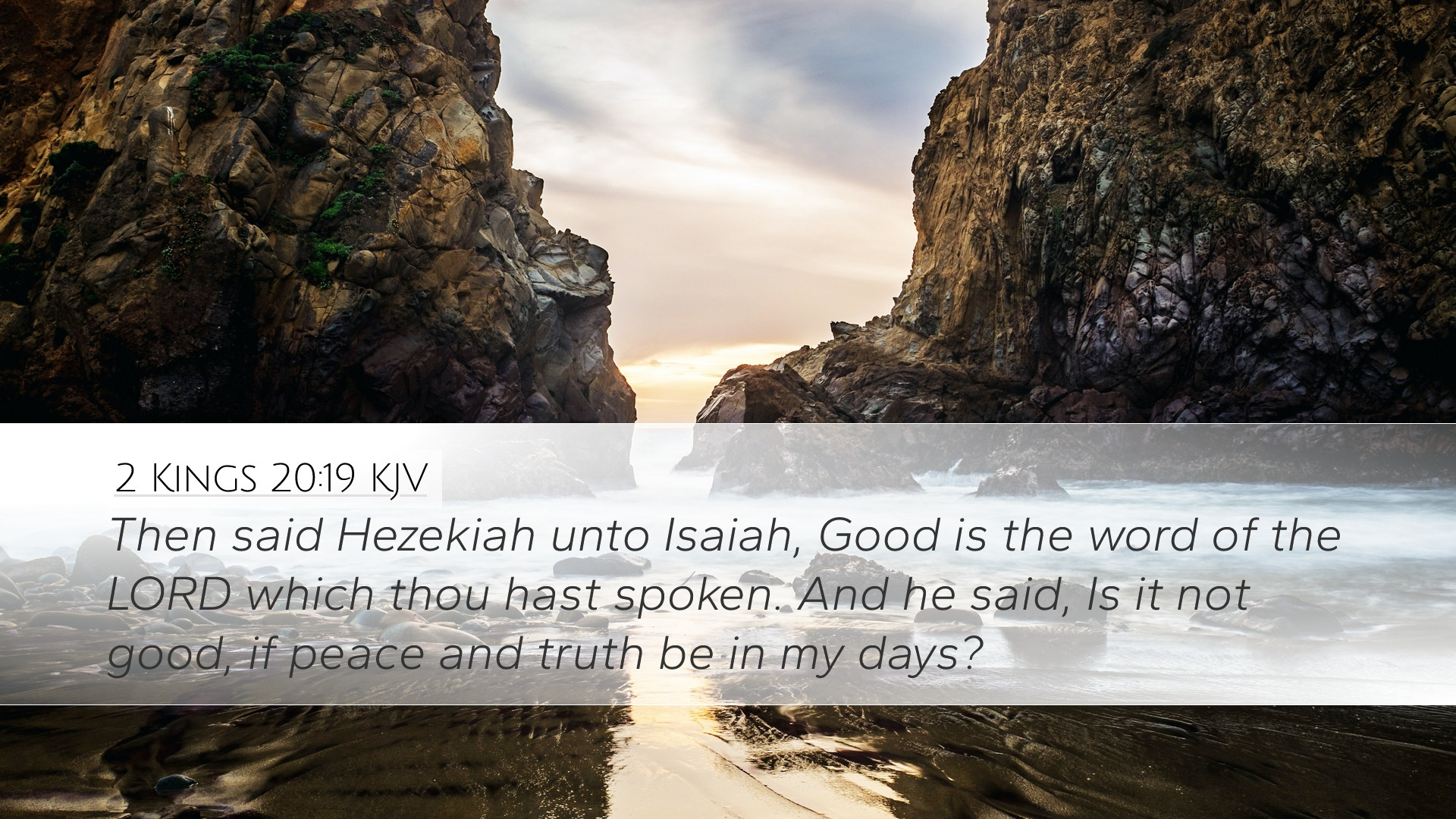Old Testament
Genesis Exodus Leviticus Numbers Deuteronomy Joshua Judges Ruth 1 Samuel 2 Samuel 1 Kings 2 Kings 1 Chronicles 2 Chronicles Ezra Nehemiah Esther Job Psalms Proverbs Ecclesiastes Song of Solomon Isaiah Jeremiah Lamentations Ezekiel Daniel Hosea Joel Amos Obadiah Jonah Micah Nahum Habakkuk Zephaniah Haggai Zechariah Malachi2 Kings 20:19
2 Kings 20:19 KJV
Then said Hezekiah unto Isaiah, Good is the word of the LORD which thou hast spoken. And he said, Is it not good, if peace and truth be in my days?
2 Kings 20:19 Bible Commentary
Commentary on 2 Kings 20:19
The verse 2 Kings 20:19 reads: "Then said Hezekiah unto Isaiah, Good is the word of the LORD which thou hast spoken. And he said, Is it not good, if peace and truth be in my days?" This statement by King Hezekiah encapsulates a profound theological reflection on the nature of God's promises and the human response to divine prophecy. This commentary seeks to explore the implications and insights derived from this passage.
The Context of 2 Kings 20
To appreciate Hezekiah's response fully, we must consider the broader narrative of 2 Kings 20. This chapter chronicles a critical period in Hezekiah's reign, marked by his illness and God's miraculous healing. Isaiah, the prophet, delivered the message of impending death, only for Hezekiah to plead earnestly to God for his life, which led to a divine promise of fifteen more years of life. Such divine interventions accentuate the character of God as merciful and responsive to prayer.
Hezekiah's Reaction
Hezekiah's reaction to Isaiah's prophecy deserves deeper analysis. He explicitly acknowledges the word of the Lord as "good," which indicates his understanding of the blessing of peace and truth evident in his rule. Here, we can draw upon Matthew Henry's insights, who comments that Hezekiah's response reflects a degree of selflessness and a focus on the greater good beyond his personal circumstance. This response showcases a commendable maturity in faith, reminiscent of leaders who prioritize the well-being of their nation over personal gain.
Peace and Truth in Leadership
The phrase "peace and truth" refers to the dual aspects of stability and integrity in governance. Albert Barnes highlights that Hezekiah's acknowledgment of these virtues implies his recognition that a peaceful reign is contingent on adherence to divine truths. In contemporary contexts, this speaks both to pastors and secular leaders on the importance of leading in accordance with God's principles to foster a climate of peace within their realms of influence.
Theological Significance
This verse also raises theological questions about God's sovereignty and human agency. The interplay between prophecy and personal experience showcases a dynamic relationship where Hezekiah is both a recipient of divine revelation and an active participant in the unfolding of God's will. Adam Clarke provides a rich commentary on this aspect, stating that while Hezekiah was given a favorable promise, it did not negate the responsibility of human actions in fulfilling God's plans. This balance of divine foreknowledge and human response offers deep theological insights for scholars and theologians regarding the nature of prophecy and human free will.
Living With Divine Assurance
Hezekiah's assurance in God's word exemplifies a life rooted in faith even amidst uncertainties. His expression of "Good is the word of the LORD" serves as a reminder to believers today regarding the necessity of embracing and affirming God's promises. Such a stance fosters resilience in the face of trials. Matthew Henry aptly notes that while Hezekiah may have been content with God's promise for himself, his regard for the future of his kingdom underscores a vital leadership quality - the ability to see beyond the immediate.
Applications for Modern Readers
- Leadership Integrity: Pastors and leaders are called to model integrity and adherence to God’s word, creating an environment conducive to truth and peace.
- Personal and Communal Reflection: When faced with God's promises, believers should seek to reflect upon how these truths impact not only their lives but also the lives of those within their communities.
- Embracing Divine Sovereignty: Understanding the relationship between God's sovereignty and human agency encourages a faithful engagement in the world’s affairs while resting in God's ultimate control.
Conclusion
In summary, 2 Kings 20:19 encapsulates profound themes of faith, leadership, and divine assurance. Hezekiah's acknowledgment of the goodness of God's word exemplifies a heart attuned to the complexities of governance while remaining reliant on divine truth. For pastors, students, and scholars alike, the lessons from this verse continue to resonate, calling forth a mature faith that embraces both God's promises and the responsibilities that come with leadership. As we contemplate this passage, may we strive to emulate Hezekiah's commitment to peace and truth in all aspects of our lives and ministries.


